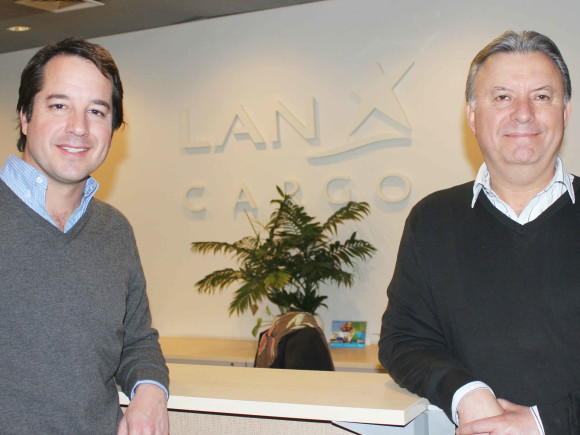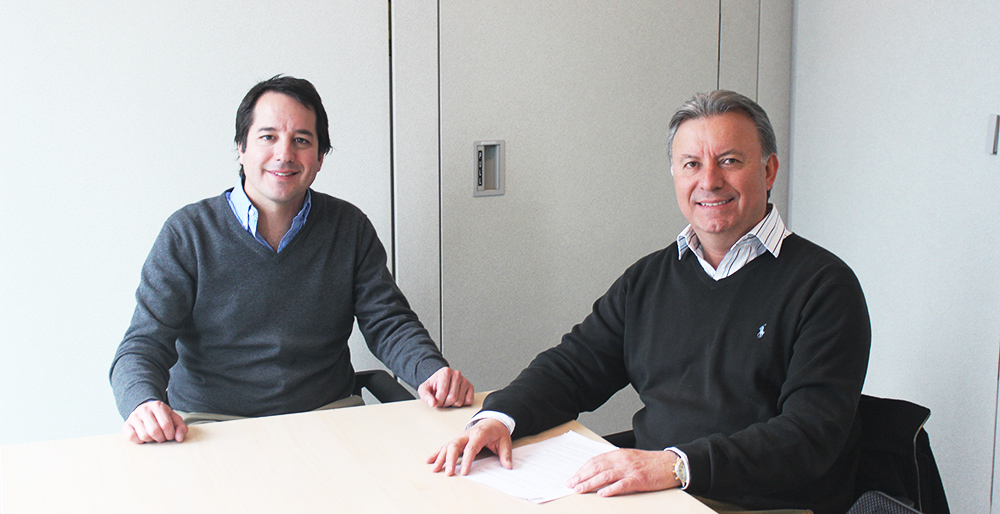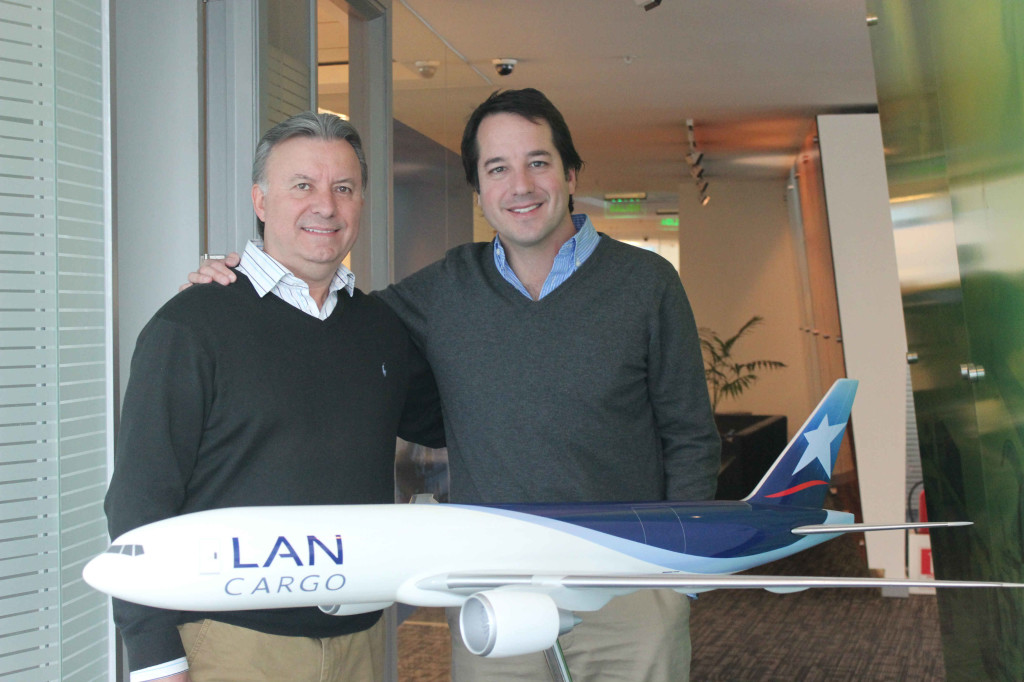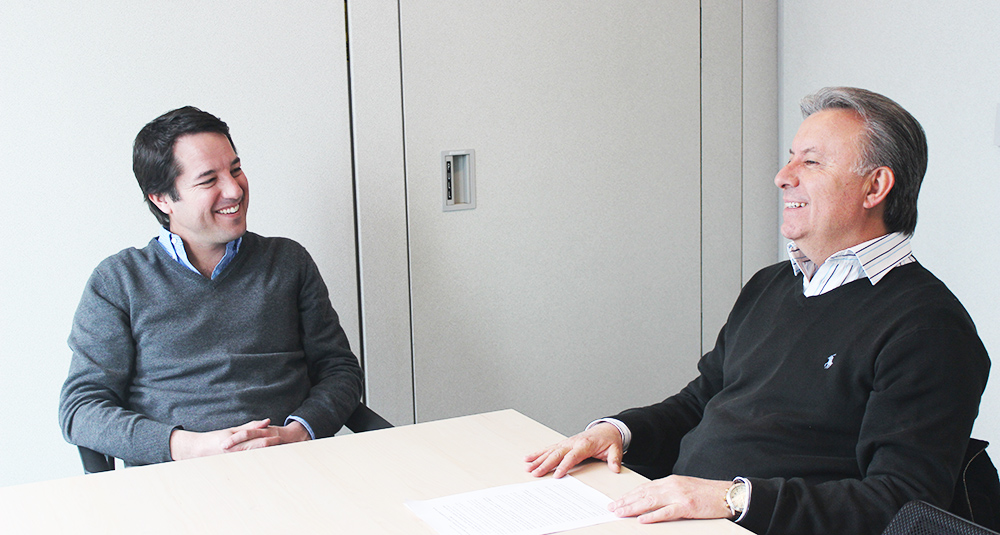- In this edition, Carlos Larraín, South America Sales Director LAN CARGO, interviews Patricio Macías, CEO of Newport Cargo, about the cargo business in the region, the company’s main projects and the relationship between the two partners.
At 53, Patricio Macías has a long career in the cargo industry. With degrees in business administration and engineering, in 1987 he took his first job in the industry at Eric Campaña y Cía, where he started as an trainee and ultimately became partner.
Patricio is currently the CEO of Newport Cargo, a company created in late 2008 from the acquisition of a small operation that Newport Argentina had in Chile. Today it is one of the country’s largest freight forwarders, with operations also in Peru, Colombia and the United States, excellent growth rates and big expansion plans.
Carlos Larraín (CL): Newport Cargo has grown significantly over the years. How did you see this growth in your day-to-day operations? I imagine that this is reflected in your results as well as in the products you transport…
PM: In Chile, we’re a big company. The company started with an operation involving 30 people, and after two years we expanded into Colombia and Peru. Last year, we launched operations in the United States after acquiring Amex. Today, Newport Cargo has around 140 employees and 65 people working in the Chilean offices.
We started out transporting 15 million kilograms and last year we transported just over 40 million kilograms. The products we transport include live animals, explosives, dry cargo and perishables, and our business includes imports, exports, maritime and air freight and reefers.
CL: We all know that the cargo industry is going through a tough time. Competition is tougher every day and there are many options available to clients. In this complex scenario, how was 2013 for your company?
PM: It was actually very good. Every year has been good for us and each one has been better than the previous one. It’s interesting because, like you said, the market is going through a tough time, but we have excellent partners who have kept our business stable.
CL: Indeed your results were well deserved. What is Newport’s formula for achieving these results?
PM: Newport is always at the forefront of the market. We diversified away from perishable products, which used to account for 95% of our business, and today stand at 75% to 80%. Working with non-perishable products allows the business to expand into other areas and makes it more stable while also offering higher profit margins. It’s a combination of things. We’ve been adding services to the business that go beyond point-to-point transportation. Newport has also been a pioneer in various aspects. Two years ago, we were the first company to take an aircraft directly to China carrying Chilean fruit. There were times when our freighters were flying three or four times a week. But those were years when people often exceeded the limits of competition between air carriers and freight forwarders.
CL: And what changes have you seen in the last few years?
PM: Today the market is more mature. We have sought to form alliances and my biggest alliance today is with LAN CARGO in every market. That’s our biggest partner. Our relationship has evolved and we have worked to maximize our sales strategy over the years.
Our partners also help us to better understand the strengths and weaknesses of the countries in which we operate. We work together to take advantage of and adjust to the opportunities that emerge. It is a relationship based on cooperation that benefits the industry.
CL: What are Newport’s forecasts for this year and the long term?
PM: Of course we want to grow. Our main plan is to improve our results. Today our sales are at US$80 million and the plan is to reach US$200 million within five years.
We also want to have more companies in the United States, to open more hubs. Today we have a partnership with a customs brokerage in the United States that enables us to do more things. The launch of our operations in Miami is an important milestone. It allows us to get to the final destination, where the clients are, and deal directly with them without intermediaries. For example, we transport perishables, live animals, explosives and other goods. We have a reputation in this market, which allows us to offer differentiated services.
CL: Specifically in Chile, what are your plans and forecasts?
PM: In the aviation industry, we believe 2014 will be very similar to 2013. In the case of Chile, Newport grew so much that it’s hard to imagine it will continue to do so.
Growth will come from other fronts and today we are looking at maritime transportation. We hope we can offer both services to our clients.
CL: Each market has its own characteristics, which is why I’d like to know: what is Newport’s value proposition in each market? What was Newport’s main competitive advantage that enabled it to reach the size it is today? And why do clients have so much trust in Newport?
PM: One of the most important things is that we have been able to maintain corporate clients in the perishable and dry cargo segments as well as large clients in every country in which we operate.
The way I see it, the business should have two things. First, every sales person must have the insight to understand they’re all client, because each one is different. Each client has its own needs, thoughts, actions and reactions and we must be able to adapt on a case-by-case basis.
Second, the foundation of this business is people. If they’re not on board, the rest of your efforts will be in vain, and in this aspect Newport is a company with very low employee turnover. On average, our employees have 15 to 20 years of service to the company and if we add up all the periods, I have people who have worked with me for over 26 years. They already know the clients and how to deal with them, so they only call me if there is any problem. We have a well-oiled system and our clients trust it. We have also been making advances and investing in technology, which is very important.
CL: What do you think about the relationship between Newport and LAN CARGO today compared to before the merger with TAM? What do you value today in LAN CARGO that you didn’t see before?
PM: We have a long history with LAN CARGO, with some of the most experienced people in the company. In fact, I was lucky enough to negotiate in person with the company’s owners.
Many years ago in Chile, LAN CARGO went through a process of not wanting to share its territory. It was the only company inbusiness, which caused a lot of friction with clients and encouraged many companies to enter the Chilean market for the same reason. It unintentionally encouraged competition. However, four or five years ago there was a change after the crisis sparked by the ISA virus in salmon and freight forwarders became LAN clients. This brought stability to the business and led to a new and closer relationship based on trust and, in our case, partnership. Oversupply in the market made things even more complicated, but LAN CARGO has an important position and has gained value that it didn’t have before.
The merger with TAM brought new opportunities for everyone. It provided LAN CARGO with a larger network, whose benefits are shared with from agents and shippers. Today the relationship between players is closer and everyone understands the business model, which has changed radically in just five years. From a forced partner, it became the best ally and today is a fully integrated and valued company. It was a positive change in every way. Before, we used to have many problems even though we transported less cargo. Today we transport much higher volumes and the problems are minimal.
CL: Changing the subject completely, as a Chilean, what do you recommend in Chile to people from other countries?
PM: I’ve been lucky to have traveled a lot, and I always tell foreigners that Chile is a different, friendly, respectful and kind country, a great place to live. The best example of that is that foreigners who come to Chile end up staying for good, and the Chileans who leave want to return.
CL: Where do you recommend visiting in the country?
PM: That depends on what you like, because we live in a country with lots of great things. If you prefer the desert, you should go to the North to discover San Pedro de Atacama; the central region is full of vineyards; further south is the volcano region with fantastic green landscapes and places like Pucón, Frutillar, Puerto Varas, Valdivia or Lago de Todos los Santos; even further south is Patagonia, Torres del Paine and Tierra del Fuego; and far off the mainland is another spectacular place called Easter Island.
CL: Specifically in Santiago, what are some of the must-see attractions?
PM: Santiago is full of interesting places to discover. In Vitacura we have Paseo El Mañío with many good restaurants, as well as Parque Bicentenario, where you can have lunch at El Mestizo and then take a walk with the kids in the park. Closer to the city center is Barrio Bellavista, which concentrates lots of nightspots, restaurants and cultural attractions, and where you can visit the home of poet Pablo Neruda; Barrio Lastarria, with its mix of culture and restaurants; Barrio Italia, which has the perfect combination between restaurants and art; Barrio Concha y Toro, where you can appreciate the city’s historic architecture; and a little less than two hours away from Santiago is Valparaíso, which is worth the trip for the city’s hillside districts.
CL: There are definitely many things to do in the city. Patricio, thank you very much for a great conversation.



